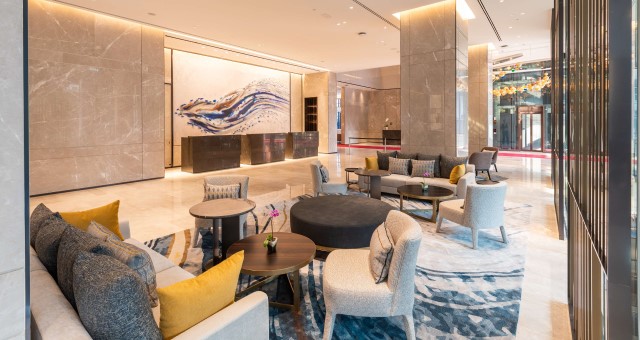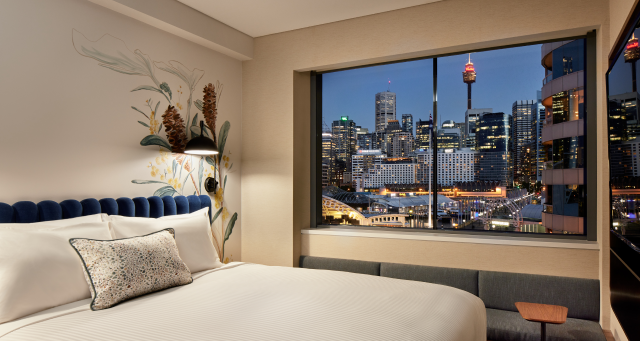BWH Hotel Group’s World Hotels held its Global Annual Conference in Thailand for the first time last month, giving senior executives an opportunity to connect with local hotels and owners amid the region’s ongoing recovery.
Ahead of the conference, BWH Hotel Group President of International Operations and President of World Hotels, Ron Pohl, spoke to HM about Asia market recovery, guest experience and the demands of the millennial traveller.
Being back in Asia, a market that has been slower to recover from the pandemic, what is the situation like now for BWH Group hotels?
I look at it with two different perspectives: where development is happening and where the business traveller and leisure traveller are going.
From a development perspective, in 2022, Vietnam was off the charts, and we saw growth there with a lot of big deals both for Best Western-branded hotels as well as World Hotels. That region is extremely strong for us and will grow from three properties to 28 properties and in the coming years as those projects get built.
From a business and leisure perspective, Japan has come back very strong, we’re seeing starting to see more activity there. Certainly Bangkok has returned with hotels running fantastic occupancies especially in the upper upscale and luxury segment – rates have returned to pre-pandemic levels, which is very positive. And then you’ve got some of the neighbouring cities and countries – Indonesia and Australia – where we continue to see more travellers. Customers are engaging in revenge travel – travelling to unique destinations that they might not have travelled before.
What are your key focus areas for hotel development?
Development is cyclical in nature. For many years, there was a lot of new construction projects – parts of Asia still have a lot of new construction, but for the most part, the growth for hotels are conversion opportunities. Soft branding is appealing. It’s a way to generate additional business through and use of a larger brands’ loyalty programs, technology, all of the things that would be impossible for an independent hotelier to do on their own. It’s also a time in the market where developers see the opportunity to move their brand or hotel up market so today that hotel might be competing in the upscale segment but with some investment it can move to upper upscale or luxury and that’s really the traction that we’ve seen with World Hotels over the past year. We signed a group of nine hotels with the Prestige Group in Canada, all very outstanding resort properties on the water in most cases, but they wanted to move up market from the upscale to the upper upscale luxury segment so they moved all nine hotels to us. We’re seeing that as well here in Asia as the opportunity to connect to a brand and then with some investment, they can get a higher average rate which flows to the bottom line. So, it certainly is a development cycle in which conversions and rebranding and moving up market are the keys to success. It’s also a time when we’ve had to be creative in what we do differently. We signed two deals in Vietnam that are branded residences – these are not hotels at all, but they wanted the name on the side of the building to show investors that it was a brand that had the support of a global organisation connected to it and therefore they would invest significant amount of dollars to buy a unit there. It’s not a short-term rental, they are actual personal residences. It’s a unique opportunity and we see that branded residence opportunity in Australia as well.
Unique, independent hotels are certainly becoming more and more popular with consumers. How is that shaping the strategy at World Hotels?
We bought the portfolio four years ago – it had three different brands: Luxury, Elite and Distinctive, and those are all very successful today. But we saw a niche that was not covered in that which is why we created the Crafted brand because customers today are looking for a unique boutique experience with an emphasis on food and beverage and the regional or local community that they reside in. You’ll have those in major cities, but travellers today, especially those aged 45 and under, want to get into the tertiary markets to really see what is out there beyond the norm; they’re very intrigued by that type of travel. It’s not just about appealing to the baby boomers, it’s appealing to the younger generation of travellers that will continue to stay at our hotels for the next 20 years.
What are your key areas of focus in terms of guest experience?
Front of mind for many travellers, especially millennial travellers, is environmental issues. We found that 70% of customers will choose a hotel that they know have sustainable efforts in place. And it’s not a balanced approach to that, Europe is probably far ahead of the world in many of those sustainability initiatives. Asia and North America have some work to do. We put in some of these practices many years ago but it’s front of mind for travellers today and they want evidence that a hotel is committed to that approach. It’s now beneficial to introduce bulk amenities, remove single-use plastics, and reduce water and energy consumption. All these things cost hotel owners a lot of money but when it’s aligned with what the traveller wants, it’s a great way to move this initiative forward.
What are luxury travellers looking for now and how are you meeting those needs?
I would say first and foremost, it’s personal attention. That’s something that is easily lost in [the hospitality] business when you have staffing challenges and people are doing everything they can to just get the work done. Unfortunately, sometimes, the friendliness part comes second. I think that’s something that was not lost here in Asia; the hospitality is just overwhelmingly positive and that makes a difference when people choose where they’re going to stay in the future. That’s a commitment for us in 2023, that personalised attention and experience for every type of traveller.
Are there any other key trends that are front of mind for you this year?
Technology must be a piece of everything that we do in the business today. Our commitment as a global organisation is to enhance our interfaces, our technology and interaction with customers in the was that they prefer to do business with us. But again, not all things are created equal. In some parts of the world, mobile key is very popular and other parts, not so much, so we can’t take a top-down brand approach. We should be smart about that and require those type of things in the markets where the customer wants it.
In terms of brand portfolio, are there any plans to expand your offering?
As a privately-held company, while we aspire to grow all of our brands, we don’t need to grow our brands because we have quarterly earnings or financial reporting requirements. We’re about quality over quantity. We added 21 World Hotels last year, we’ll add 40-50 World Hotels this year. And within that, it’s also the size of the hotels that we’re adding. While Crafted are smaller boutique 100-250 room hotels some of the other hotels that we’ve added, the branded residences for example was 3,000 units. The Stratosphere in Las Vegas is 2,400 units. We are signing a hotel in Tokyo that is 1,600 rooms. Size matters when you’re developing but we also don’t want to infringe in the markets where we already have hotels and possibly negatively affect our partners that are already in those markets. So, we’re more selective in our process. We’re very careful and we want to know that we can provide the value add that they expect when they join us versus what they might get is just part of a development activity because franchises have to grow.
Can you share you outlook for the business in 2023?
I think we need to take advantage of the opportunity we have through the first half of the year. I’m cautiously optimistic about the second half to make sure that it continues to gain strength but again, this recovery was not created equally, and I don’t think it will retract equally either. I think that Asia is pretty strong for the year, it might face some headwinds in 2024. I’m a little less optimistic about North America, but we’re a year away from an election so most things are pretty stable when that happens. We are seeing signs of layoffs from major corporations that could potentially affect the second half of the year. We budgeted very conservatively because of what could happen and we’re always delighted when we exceed those expectations and more importantly, that we continue to help the hotels maximise their top line and look for opportunities to reduce expense for them because all costs are increasing beyond what we’ve ever experienced and helping them maintain their bottom line is really what’s important for them to sustain the next 12-18 months.



